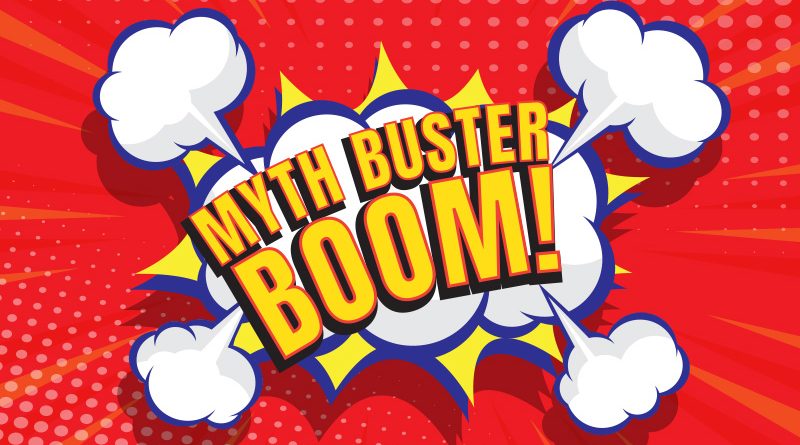5 Grant Myths That Need to Be Busted
In the world of grants and nonprofits, we hear a lot of half-truths, misconceptions and downright myths about grants and funding. GrantWatch feels it’s time to set the record straight. Our goal is to clear up some of the misconceptions that our subscribers may have so they can apply for grants with the correct information in hand. So, for your reading pleasure, here are five grant myths that need to be busted.
1) Grant Money Has to be Paid Back:
Perhaps the biggest grant myths folks believe about grants is whether or not they must pay the money back. In fact, this is one of those questions the GrantWatch team gets all the time, “When do I have to pay the money back?” A grant is not a loan, and the money never needs to be paid back. However, it’s extremely important to be aware that there are rules regarding how the funds can be spent, and grant recipients must allocate all the requested funds in the grant application. If the rules are not followed, the grantor may then demand repayment. However, as long as you are honest and keep excellent records, this should never be a worry.
2) Grant-Giving-Organizations Require Upfront Payment:
Of all the grant myths on this list, this might be the one we worry about the most. Unfortunately, there are a lot of scams out there, and this is one of them. It never costs to apply for or receive a grant. What’s more, there is NEVER a guarantee. If someone says they guarantee you will win a grant, they are lying to you. And, if they request your banking information or produce a fee to accept funds, they are committing fraud. Avoid this at all costs. This is not to be confused with subscriptions to a site, paying for a classified ad, or the cost of hiring a grant writer; these are costs you negotiate separately.
If you think you may have been a victim of a grant scam, file a complaint with the Federal Trade Commission online, or call toll-free, 1-877-FTC-HELP (1-877-382-4357); TTY: 1-866-653-4261. You can also report grant-related scam attempts to the Health and Human Services (HHS) Fraud Hotline at 1-800-447-8477.
3) Nonprofits Should Only Apply For Grants in Their Direct Sector:
So, one of the less obvious grant myths, but no less harmful to successfully navigating grants and funding. Grants generally have multiple categories which grant seekers can apply under, meaning, they are cross-referenced to reach a wider pool of grant seekers. For example, if a grant on GrantWatch.com with this description: “Grants ranging from $3,000 to $15,000 to North Carolina nonprofit organizations and government agencies for new or existing programs that make a positive impact on the lives women and girls in Avery, Ashe, or Watauga Counties.” This grant is cross-listed on the website under several different categories: grants for women, children, community service, secondary education, and youth. Additionally, the language may be intentionally vague so funding can cover a number of different costs. It pays to think outside the box.
4) Re-applying for a Grant Next Cycle is a Waste of Time:
This grant myth actually seems to make sense, but it’s predicated on the wrong criteria. There is always a limit on the amount of grant funds that are available and each source has its own rules. Whether it’s a municipality awarding funds to a nonprofit to improve a community or a foundation giving a specified amount of money for a category-based-project, funding is always finite. Once the money is gone, it’s gone. However, many funding organizations have grants that revolve, or return once funding is again in place. Qualifying for a grant doesn’t guarantee funding, but there’s always next quarter or next year or whatever the criteria is for re-applying.
5) Grant Applications Are Useless After Rejection Or Submission:
This grant myth depends on circumstance and whether or not a grant seeker will apply or reapply in the future. After all, grant writing is not usually a one-time thing. If you hire a grant writer or someone in your nonprofit writes an incredible application, file that piece of writing away for future consideration, it is inherently useful. A good piece of writing can be re-examined, tweaked, and used again in another application. That’s why it is critical to save all the parts of the process and past applications. This also has the added benefit of allowing you and your team to see what works and what doesn’t.
GrantWatch hopes this grant myth-busting list helps you on your grant journey. Happy searching!
About GrantWatch
With close to 8,000 grants currently available, GrantWatch.com is the leading grant listing directory. Upgrade to a MemberPlus+ plan to view the full details of current grants, including eligibility criteria and application information. So, for more information, you can also visit the GrantWatch FAQ page. To conclude, to see the great value of the top 20 GrantWatch features, click here.

